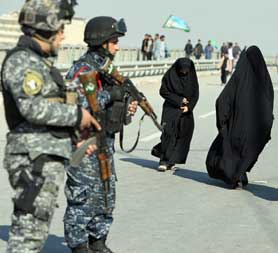Blair’s legacy? Violence still convulses Iraq
As Tony Blair faces more questions from the Iraq inquiry about his decision to go to war, risk consultant John Drake looks at the ongoing violence in Iraq that has left a hundred dead in recent days.

Over 100 people have been killed in several bomb attacks in Iraq over the past few days and several hundred more have been injured. These attacks come despite a drop-off in violence in previous months.
The attacks have targeted police recruits in Tikrit (the former hometown of Saddam Hussein) and also provincial council members and Shi’ah pilgrims around the city of Ba’qubah and Kerbala.
As the Iraq inquiry prepares to refocus its attentions on Tony Blair, Prime Minister during the time of the Iraq war, John Drake, an Iraqi-based British private security expert, looks at the state of the nation, what has led to this upsurge in violence, and what it means for Iraq’s longer term future.
Notable attacks
The attack on the police centre in Tikrit was notable for several reasons. Not only was it the biggest attack in the country since the Iraqi government was formed, it was the most deadly incident since a siege on a church in Baghdad almost three months ago. The majority of victims were Sunni Muslims, which is also less usual for Iraq. Over recent years the majority of mass casualty attacks in the country have targeted the Shi’ah community.
Read more - Christmas in Iraq: living in fear
The targeting of both the police and provincial council in Ba’qubah demonstrates the intent of radical Islamist groups to disrupt the activities of the authorities. By killing Government employees it weakens the state and makes it harder to conduct counter-insurgency operations. It also undermines the government’s credibility in terms of maintaining stability.
Several of the victims of the third attack on a provincial council convoy in Diyala were Shi’ah pilgrims, likely travelling towards the city of Karbala in preparation for the holy period of Arba’een. They may not have been the intended target but Shi’ah pilgrims have been attacked on numerous occasions in the past.
More attacks expected
With Shi’ah visitors set to travel across Iraq over the coming days, more such attacks are to be expected. The majority of pilgrims will travel to the holy city of Karbala, with Arba’een set to culminate on 25 January. Many of the travellers will be from overseas, including from countries such as Bahrain and Iran.
Previous Arba’een events have seen numerous attacks with foreign worshippers amongst the casualties. However, this year the Iraqi authorities are clamping down on suspected militant groups. Several cells are already reported to have been arrested in recent days. Travel restrictions and increased security measures at checkpoints are also to be expected.
The last major Shi’ah event in the religious calendar was Ashura in mid-December. Attacks once again targeted religious travellers, although the event was quieter than earlier years. One of the main factors believed to be responsible for the decline in attacks was the capability of the Iraqi security forces.
Many Iraqis will be pleased to see the Americans leave, but some are also harbouring quiet concerns.
With the US military set to withdraw its troops from Iraq by the end of 2011 their capabilities are set to come under increasing scrutiny.
American withdrawal
Many Iraqis will be pleased to see the Americans leave, but some are also harbouring quiet concerns. A security vacuum could allow for a regrouping and consolidation of threat groups such as Sunni Islamists in the central provinces, ethno-nationalist vigilantes in the northern provinces and Shi’ah militants in the southern provinces. A lot will depend on the ability of the Iraqi police and army to clamp down on the many illegal organisations still operating covertly in the country.
The US military has been providing the Iraqi forces with extensive training over recent years, but much work still needs to be done. Last week an Iraqi soldier undergoing training near Mosul opened fire on his US trainers, killing two and injuring one before being shot dead himself. Such incidents are rare but do still continue to occur, underscoring a large training gap still to be filled.
Some Iraqi politicians want to retain a degree of US support in the country. It is a controversial suggestion not likely to win support amongst the electorate but if a security vacuum allows militants and terrorists to reassert their violent presence in the country, it will be even more damaging to the reputation of the Government.
On the other hand, however, Shi’ah militant groups and the bold religious politician Muqtada al-Sadr have warned against keeping US forces beyond the end of the SOFA (Status Of Forces Agreement) deadline in December. Threats have been made that attack would be justified in the event that the planned withdrawal does not take place.
In Iraqi politics there is much to play for – not least access to the extensive oil wealth yet to be extracted from the country’s fields.
Recent months have seen a gradual decline in violence in the country, but conditions could still deteriorate once again. Much will depend on the action of Government and whether or not community groups feel themselves to have been marginalised on key policy issues in Parliament. In Iraqi politics, there is much to play for – not least access to the extensive oil wealth yet to be extracted from the country’s fields.
Indeed the prizes are so great that some groups may be willing to turn back to violence to ensure that they are not excluded by a rival. Many are cautiously optimistic over the country’s outlook but with ongoing mass casualty attacks and the US deadline fast approaching, confidence will likely be tested more and more over the course of 2011.
John Drake is a senior risk consultant with AKE Group, a British private security firm working in Iraq from before 2003. You can follow John on twitter at twitter.com/johnfdrake